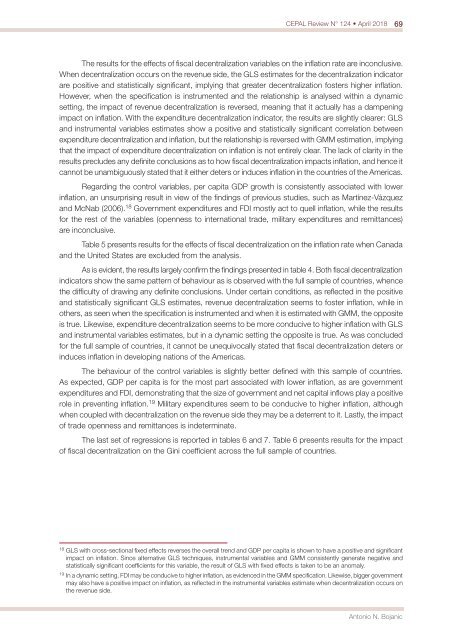CEPAL Review no. 124
April 2018
April 2018
Create successful ePaper yourself
Turn your PDF publications into a flip-book with our unique Google optimized e-Paper software.
<strong>CEPAL</strong> <strong>Review</strong> N° <strong>124</strong> • April 2018<br />
69<br />
The results for the effects of fiscal decentralization variables on the inflation rate are inconclusive.<br />
When decentralization occurs on the revenue side, the GLS estimates for the decentralization indicator<br />
are positive and statistically significant, implying that greater decentralization fosters higher inflation.<br />
However, when the specification is instrumented and the relationship is analysed within a dynamic<br />
setting, the impact of revenue decentralization is reversed, meaning that it actually has a dampening<br />
impact on inflation. With the expenditure decentralization indicator, the results are slightly clearer: GLS<br />
and instrumental variables estimates show a positive and statistically significant correlation between<br />
expenditure decentralization and inflation, but the relationship is reversed with GMM estimation, implying<br />
that the impact of expenditure decentralization on inflation is <strong>no</strong>t entirely clear. The lack of clarity in the<br />
results precludes any definite conclusions as to how fiscal decentralization impacts inflation, and hence it<br />
can<strong>no</strong>t be unambiguously stated that it either deters or induces inflation in the countries of the Americas.<br />
Regarding the control variables, per capita GDP growth is consistently associated with lower<br />
inflation, an unsurprising result in view of the findings of previous studies, such as Martínez-Vázquez<br />
and McNab (2006). 18 Government expenditures and FDI mostly act to quell inflation, while the results<br />
for the rest of the variables (openness to international trade, military expenditures and remittances)<br />
are inconclusive.<br />
Table 5 presents results for the effects of fiscal decentralization on the inflation rate when Canada<br />
and the United States are excluded from the analysis.<br />
As is evident, the results largely confirm the findings presented in table 4. Both fiscal decentralization<br />
indicators show the same pattern of behaviour as is observed with the full sample of countries, whence<br />
the difficulty of drawing any definite conclusions. Under certain conditions, as reflected in the positive<br />
and statistically significant GLS estimates, revenue decentralization seems to foster inflation, while in<br />
others, as seen when the specification is instrumented and when it is estimated with GMM, the opposite<br />
is true. Likewise, expenditure decentralization seems to be more conducive to higher inflation with GLS<br />
and instrumental variables estimates, but in a dynamic setting the opposite is true. As was concluded<br />
for the full sample of countries, it can<strong>no</strong>t be unequivocally stated that fiscal decentralization deters or<br />
induces inflation in developing nations of the Americas.<br />
The behaviour of the control variables is slightly better defined with this sample of countries.<br />
As expected, GDP per capita is for the most part associated with lower inflation, as are government<br />
expenditures and FDI, demonstrating that the size of government and net capital inflows play a positive<br />
role in preventing inflation. 19 Military expenditures seem to be conducive to higher inflation, although<br />
when coupled with decentralization on the revenue side they may be a deterrent to it. Lastly, the impact<br />
of trade openness and remittances is indeterminate.<br />
The last set of regressions is reported in tables 6 and 7. Table 6 presents results for the impact<br />
of fiscal decentralization on the Gini coefficient across the full sample of countries.<br />
18<br />
GLS with cross-sectional fixed effects reverses the overall trend and GDP per capita is shown to have a positive and significant<br />
impact on inflation. Since alternative GLS techniques, instrumental variables and GMM consistently generate negative and<br />
statistically significant coefficients for this variable, the result of GLS with fixed effects is taken to be an a<strong>no</strong>maly.<br />
19<br />
In a dynamic setting, FDI may be conducive to higher inflation, as evidenced in the GMM specification. Likewise, bigger government<br />
may also have a positive impact on inflation, as reflected in the instrumental variables estimate when decentralization occurs on<br />
the revenue side.<br />
Antonio N. Bojanic


















